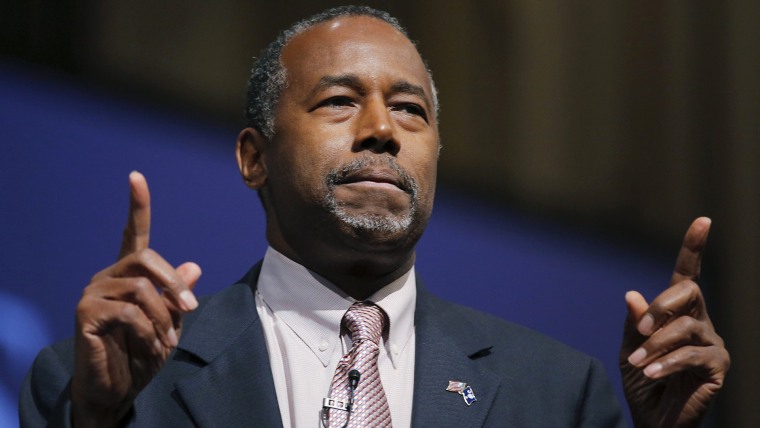Last week's debate for Republican presidential candidates wasn't necessarily flattering for Ben Carson, especially on the issue of foreign policy. But former CIA Director Michael Hayden nevertheless defended the confused candidate on Friday, saying he's been impressed with Carson.
“I must admit I had one lengthy phone call with Dr. Carson about two months ago,” Hayden said. “His instincts are all right.” The retired intelligence chief added. “He asked the right questions…. he had good follow-on questions.”
One wonders if Hayden was watching "Fox News Sunday" yesterday morning. The Washington Post reported:
Republican presidential candidate Ben Carson struggled Sunday to attach specifics to his plan to defeat the Islamic State militant group, again illustrating the former neurosurgeon's difficulty discussing foreign-policy matters. Speaking on "Fox News Sunday," Carson could not name a specific country or leader he would call to assemble an international coalition to counter the Islamic State, despite being asked three times by host Chris Wallace.
The context of the interview always matters, though it's especially important in this case. The terrorist attacks in Paris were on Friday night, so when Carson agreed to appear on a Sunday show less than two days later, the Republican presidential hopeful must have realized he'd face a series of questions about national security. He and his campaign team had ample time to prepare talking points.
And yet, Carson appeared lost, going so far as to reiterate his odd belief that the Chinese military has intervened in Syria -- a claim he made at last week's debate, despite the fact that isn't supported by any facts.
Asked how many U.S. troops he's prepared to deploy to the Middle East for counter-terrorism missions, he told Fox's Chris Wallace, "I don't want to put a specific number on it or indicate what types of people there are because those are decisions that, I think, are made by people who have a tremendous amount of military experience and capability. For me to pretend like I have all that knowledge and the ability to formulate the specific plans is foolish, and I think anybody else who thinks they know it all is foolish also."
Carson added, "You have to be willing to recognize that you are not the end-all, but that you are the conduit for the conduct of American policies [if elected president]."
In other words, vote for Carson because he can't answer detailed questions?
On the point of refugees, the retired right-wing neurosurgeon added, "You know, the reason that the human brain has these big frontal lobes as opposed to other animals, because we can engage in rational thought processing, we can, you know, extract information from the past, the present, process it and project it into a plan. Animals, on the other hand, have big brain stems and rudimentary things, because they react. We don't have to just react, we can think."
It can be difficult to watch interviews like these from the perspective of a Republican primary voter, but it's hard not to wonder how many people watched Carson's appearance and came away confident in his abilities to lead the world's largest and best military in a time of crisis.
